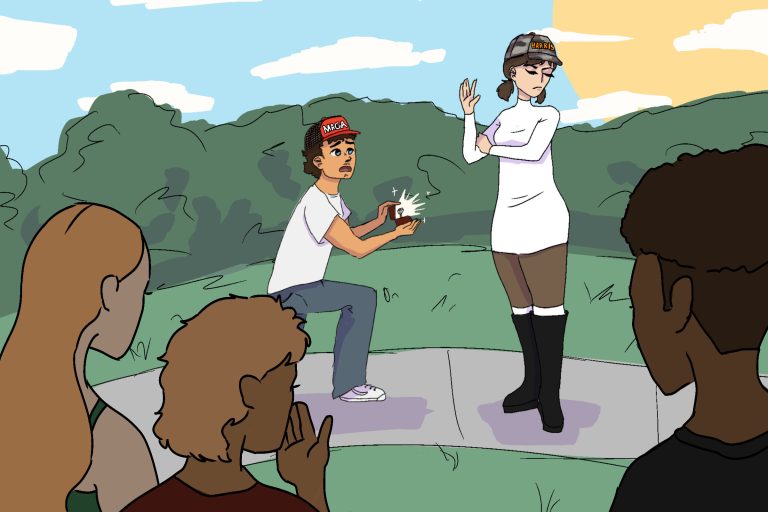Before the election, I asked a cute guy in my political science class where he planned to vote. He responded with a simple “nowhere,” then explained to me that his vote, like everyone else’s, didn’t matter. Thus, our eternal love story came to an end.
The conversation, however, opened a door of introspection. Until recently, I never thought that politics could play an important role in my relationships. Usually I’m more interested in simple things, like if they have a good relationship with their parents or if they shower daily. Maybe it’s because it was my first time voting in a presidential election, but I became acutely aware of how political values can filter the dating pool.
After this last election, it became clear that some people, myself included, just want to be romantically involved with someone who shares the same political values as them. And that’s not a bad thing.
Society generally considers politics too “taboo” a subject to be discussed in a conversational setting. It’s the unspoken rule of dinner parties: no sex, no religion and absolutely no politics. Most people want avoid the kind of conflict that turns a civilized meal into a verbal tug-of-war. So we sit down, eat, and choose to beat around the bush, sticking to safe topics like the weather or last night’s game.
If politics are too sensitive to discuss with family or friends – the people who know us best – there is no reason to intentionally choose a partner who brings the same tension into our daily lives. Of course, we can’t choose our loved ones, but we can choose who we share our future with.
Core political values play an important role in how we choose to handle major life decisions, like raising children or choosing a career path. Our political views inform our approach to job security, financial goals, saving and spending. When these views conflict, long-term planning becomes difficult, ultimately leading to resentment and hatred. put in danger trust and intimacy of the relationship.
Our political beliefs can also impact family matters. If a couple decides to have children, their political values will guide how they view a child’s future. Although it is never acceptable for parents to force their children to share their political beliefs, these values can still shape a person’s childhood. For example, one parent might prefer a public school education, while the other might prefer an alternative education, such as a private school more aligned with their political beliefs.
How we approach political issues also shapes the dynamics of a relationship, even before things get serious. For example, abortion, a highly controversial and polarizing topic, opens up broader conversations about bodily autonomy, individual rights, and government interference. Some see abortion as a moral and ethical dilemma, while others see it as a matter of personal freedom and access to health care. Knowing where your partner stands reveals more than political affiliation: it’s a reflection of the values that shape how they engage in the world.
Ultimately, these are not superficial disagreements. If partners do not discuss these values at the beginning of a relationship, it can create a gap that widens over time. Repeated conflict shatters the sense of emotional security and reinforces the belief that with each fight you are fundamentally incompatible. In the end, what seemed like minor differences can turn into a constant source of tension and resentment.
Even if some argue the best way to reinforce our own beliefs is to challenge them with the opposite point of view, this should not apply to romance. Of course, find someone who matches all of your political values is unrealistic, but they should agree with a majority. Questioning your belief system may work in the classroom, but a perpetual battle causes unnecessary tension in a personal relationship.
As the election draws to a close, I never want to “undo” my partner’s vote. This is why I place political values above small things when it comes to my relationships. We should discuss politics early on to strengthen the relationship later.
Get engaged with Fox News or CNN – don’t get engaged with the opposing party.
Angelina Akouri is an opinion columnist studying English and political science. She writes about the influence of pop culture on college students and their relationships. She can be contacted at akouria@umich.edu. His column “Almost Cultivated” appears twice a week.


